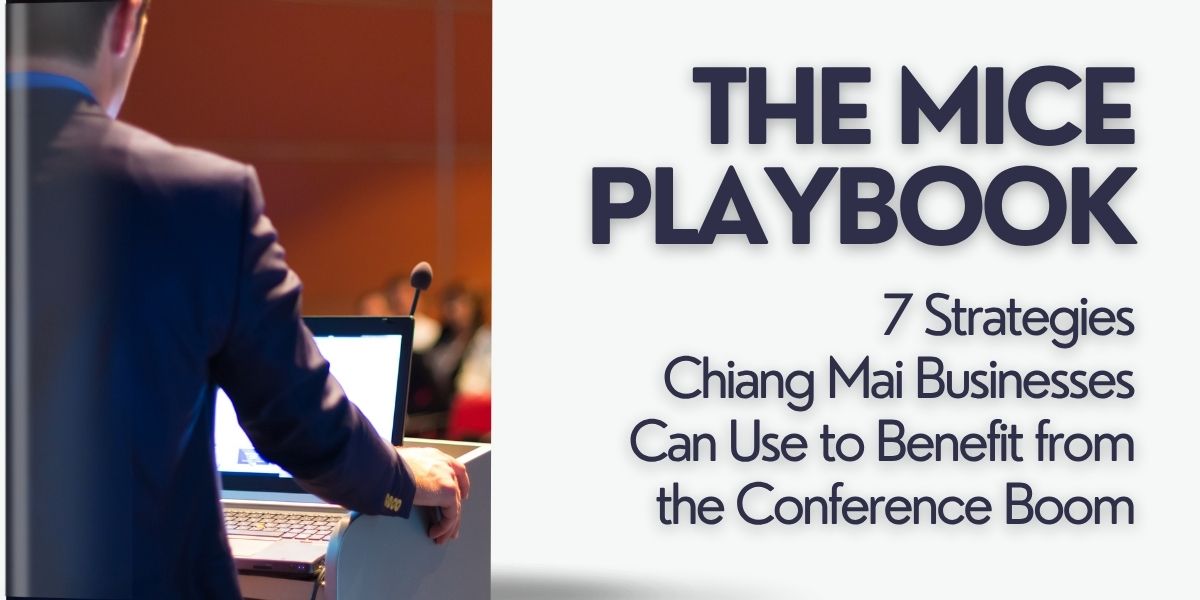Chiang Mai’s MICE industry is booming. Here are seven proven strategies local entrepreneurs can use to attract delegates, increase revenue, and position their business at the center of Thailand’s fastest-growing economic sector.
Chiang Mai’s New Economic Engine
Not long ago, Chiang Mai’s business narrative was centered on tourism, hospitality, and craft exports. But today, the city’s economic pulse is increasingly powered by something broader — MICE: Meetings, Incentives, Conferences, and Exhibitions.
With international events like IFEA Asia 2026, Nomad Summit 2026, FAB 2026, XAFS 2026, ARAT 2026, and JCI Thailand 2025, Chiang Mai is entering what the Thailand Convention & Exhibition Bureau (TCEB) calls “the regional age of business convening.”
The implications are enormous. Every delegate that lands in Chiang Mai brings spending power, global perspective, and opportunity. Every event generates a ripple through hospitality, transport, marketing, and creative services.
But the real winners aren’t just hotels or event halls — they’re the local businesses that know how to align with this new economic wave.
Here’s your playbook.
1. Map the MICE Calendar — and Anticipate the Surge
The first rule of MICE success is simple: be proactive, not reactive.
Each major conference attracts hundreds or thousands of high-value visitors — yet most local businesses only react once the crowds arrive. The smarter move is to track the Chiang Mai MICE calendar (available via TCEB and CMBN’s event listings) and start preparing three months in advance.
For example:
- Offer co-branded promotions during Chiang Mai Design Week (Dec 2025)
- Develop delegate packages before the Nomad Summit (Jan 2026)
- Create side-event menus or collaborations tied to FAB 2026 and XAFS 2026
These predictable surges can become reliable revenue streams — if you plan ahead.
For an overview of the industry and upcoming events, see What Is MICE? and The MICE Ecosystem.
2. Turn Your Venue into a Mini-Conference Hub
You don’t need to run a convention center to profit from conferences. Boutique hotels, cafés, restaurants, and even art studios can position themselves as micro-venues for breakout sessions, speaker dinners, or networking events.
Key tips:
- Offer private space rental by the hour, not by the day
- Provide high-speed internet, sound systems, and projection screens
- Create “meeting menus” with flexible F&B options
As explained in Tourism Playbook 2025, small businesses that adapt hospitality for productivity will lead Chiang Mai’s new tourism era — one focused on purpose, not just pleasure.
3. Sell Experiences, Not Just Services
Delegates travel to conferences to learn, but they stay for the experience.
Businesses that can turn their product into a story will capture that emotional connection.
If you’re a coffee roaster, offer a “Cupping & Conversation” session during event week. If you’re a craftsman, host a “Meet the Maker” afternoon. If you run a co-working space, turn your venue into a post-conference co-work lounge.
As covered in Storytelling for Brands, customers remember experiences that make them feel part of something bigger — especially in a destination as rich in culture as Chiang Mai.
4. Partner With Organizers Early
Conference organizers are constantly searching for reliable local suppliers — from event decorators to digital marketers, translators, and transportation providers.
Reach out to event committees at least 60–90 days in advance with concise, professional proposals. Offer special pricing for bulk bookings and emphasize service reliability and English-language communication.
Forming these early alliances can secure repeat contracts for years. This approach is explained further in Strategic Partnerships — where collaboration isn’t just a tactic, it’s a growth engine.
5. Align Your Brand With Innovation and Sustainability
Today’s MICE audience expects more than good service — they expect values alignment. That means sustainability, ethics, and inclusivity aren’t optional add-ons; they’re competitive advantages.
- Replace single-use plastics with biodegradable materials
- Source locally — from food to décor — to highlight Chiang Mai’s creative supply chain
- Offer carbon-offset options for event packages
- Highlight your commitment to community through clear, visual signage or digital storytelling
If you’re unsure how to begin, start with the framework in Sustainable Business Practices — a step-by-step guide to embedding ethics into your operations.
6. Integrate Digital Tools Into the Delegate Journey
MICE delegates are digital by default. They expect to find accurate information, make instant reservations, and receive frictionless service.
Simple but powerful upgrades include:
- Creating Google My Business event tags for each conference period
- Offering LINE or WhatsApp booking options
- Embedding event hashtags into your social posts
- Partnering with platforms like CMBN Business Directory for visibility
As detailed in How to Get the Right Things Done in Your Business, the key is not adding more tech — it’s using the right tools for the right task.
7. Convert One-Time Visitors Into Lifetime Advocates
The conference might end, but the relationship doesn’t have to. Smart businesses treat delegates not as customers, but as potential ambassadors.
Here’s how to turn short-term encounters into long-term networks:
- Collect contact details through digital forms or QR codes
- Send post-event thank-you emails with discount offers or downloadable guides
- Stay active in LinkedIn or Facebook event groups
- Invite past attendees to virtual events, new launches, or Chiang Mai updates
Delegates who feel connected to a city are more likely to return — not just for tourism, but for business investment. As seen in Local Business Wins Big from the MICE Boom, repeat visitors often become collaborators, partners, or even investors.
Chiang Mai’s Conference Boom by the Numbers
According to TCEB’s latest data (2025):
- The MICE industry now contributes over 12% of Chiang Mai’s local GDP
- Average delegate spending exceeds THB 21,000 per trip — roughly double that of leisure tourists
- The number of international conferences hosted in Chiang Mai rose 58% year-over-year
These numbers aren’t abstract — they represent the growing alignment between Chiang Mai’s creative DNA and global business trends.
The Takeaway
The MICE boom isn’t just good news for hotels and convention centers — it’s a once-in-a-generation opportunity for Chiang Mai’s entire business community.
From cafés and co-working spaces to tour operators and tech startups, every local entrepreneur can plug into this ecosystem. The key is to think ahead, collaborate widely, and tell your story through an experience lens.
Because in the end, MICE isn’t about meetings. It’s about meaning — and no city delivers that better than Chiang Mai.








